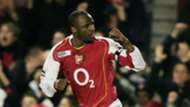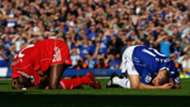
The Mali international has called time on his career, one in which he never quite lived up to the sizeable expectation placed on his shoulders
It was a heady time for Liverpool fans, the summer of 2005.
Fresh off an unexpected – and frankly quite miraculous – Champions League triumph over AC Milan in Istanbul, the club set about the task of cementing its place within the elite. For all the exhilaration of that night at the Ataturk Stadium, a repeat of the fifth-place finish in the league the season prior would simply not do.
With a view to bridging the gap to the top of the table, in came goalkeeper Pepe Reina, defender Daniel Agger and towering forward Peter Crouch, among others. However, the greatest enthusiasm, at least in the mind of manager Rafa Benitez, was reserved for a 21-year-old defensive midfielder from his former club Valencia: Mohamed Sissoko.
“He was called the new Vieira a few years ago and he played many games when he was 18 and 19,” said the Spanish manager. “He has incredible ability for his age.
“I saw Vieira when he was 18-years-old and he was no better than Sissoko. Sissoko runs more than Vieira and in a couple of years he will be more dynamic than Vieira and a better player.”
High praise indeed, but the comparison with Vieira was even more pointed than at first seemed apparent.

That was the summer when Arsenal, who had finished 25 points better off than the Reds, moved on their legendary captain and leader. Vieira, for so long courted by Europe’s elite, had finally opted for a move to Juventus, leaving behind a Gunners team most considered shorn of leadership and ripe for toppling.
Signing a player in his mould, but with the potential to be even better, was a crucial step in getting in touch with the top of the table.
Sissoko, for his part, found the comparisons quite flattering.
“I am aware there have been comparisons to Patrick. He was a great Arsenal player and was a huge influence on the English game in his time here,” he began. “I’m only 22.
“I still have a lot to learn and a lot of work to do on my game. If I want to be like Patrick then I have to work hard to become a better player. Maybe one day people will say that the comparisons were valid – that’s my goal.”

As it turns out, he would channel Vieira, but not in precisely the manner either he or Benitez would have hoped.
In 2008, Sissoko made the same journey from England to Turin. One wonders if, by any chance, he enquired after the availability of the No.4 shirt.
His 30-month stay in the Premier League did not, however, have the same definitive impact as the iconic Frenchman. Even accounting for the fact that the comparison did him little favours, there was certainly enough talent there that he could have achieved a lot more than he managed during his time on Merseyside.
Aside a penchant for a booking (and a sending-off against Sunderland in November), there was a great deal to be enthused by in his early Liverpool performances, as Benitez eased him in over the course of the first half of the season. The reigning champions were also going strong in Europe, unbeaten through the Champions League Group Stage and only breached once in a group that contained local rivals Chelsea.
It was in that competition, however, that tragedy would first strike for Sissoko.
In the first leg of their Round of 16 knockout tie against Benfica, the Mali international suffered a ghastly head injury in a contest with Beto, leaving him a cut on his forehead. The worst of it, however, was serious bruising to his retina that left him blind for 36 hours and effectively compromised his right-sided vision.

Liverpool would lose 1-0 on the night after losing their anchor man on the half-hour mark, and then capitulate in the second leg at Anfield to exit the competition after a 3-0 aggregate defeat.
Sissoko would miss a whole month of action, returning in an FA Cup tie against Birmingham sporting goggles which he discarded after the opening 10 minutes.
“The glasses were steaming up for the first 10 minutes I wore them, so I took them off,” he explained. He then laid on an assist as Liverpool recorded a 7-0 victory.
Against medical advice, Sissoko refused to play with the protective glasses, citing discomfort, and risked permanent damage to his eyesight whenever he stepped onto the pitch.
In 2007, he admitted to The Mirror that he had lost sight of a high ball during a Premier League game against Manchester United, and was often in pain in the harsh glare of direct sunlight.
In truth, he never fully recovered from it. In his own words, it was “not the same”.

In late 2006, he dislocated his shoulder and missed three months of action, making only 16 league appearances for Liverpool that season.
In his absence, Benitez signed Javier Mascherano from West Ham in January 2007, effectively ending Sissoko’s run as a starter at Anfield.
It is tantalizing to wonder just what might have been had his right eye not suffered such severe damage, or if a career that took in Spain, England, Italy and France (in 2011, he moved to Paris Saint-Germain from Juventus) had not been so often halted due to injury.
Still, he retires having won two Uefa Super Cups, Ligue 1 and La Liga titles, one FA Cup and the Europa League.
He never quite lived up to Benitez’s praise, or his own promise, but in his own right, Sissoko lived the very pinnacle of the European game and also had an accomplished international career with Mali.
Not quite Vieira then, but one can scarcely hold that against him.

Be the first to comment